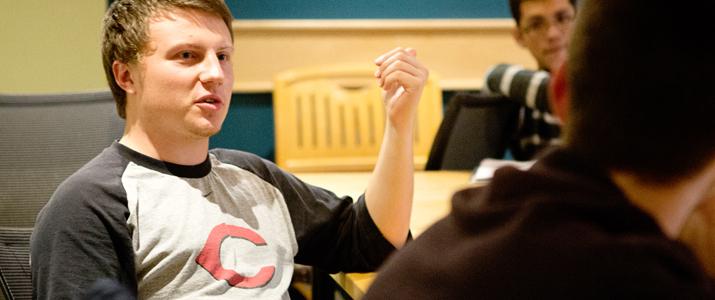

The Department of Classics & Religious Studies offers three interrelated programs: Classical Languages (Greek and Latin), Classical Civilization/Archaeology, and World Religions.
From the Department Chair
Welcome to the Department of Classics and Religious Studies (CARS)! We have some great academic programs that develop skills and sharpen thinking with challenging texts. I would point especially to our innovative Difficult Dialogs classes and study abroad opportunities. We offer several majors and minors, including Religious Studies, Classical Civilization, Greek, and Latin. We also have an Honors Tutorial College major in Classics and Religious Studies. You can complement your program with us, as well, by signing up for an interdisciplinary certificate in Islamic Studies or Jewish Studies or both! Our academic tracks offer the flexibility for students to study broadly or to focus on areas of special interest such as archaeology, ancient history and literature, religions, or languages. Explore our offerings and make your course of study your own!
Learn, too, about our award-winning faculty. All of us in CARS have extensive expertise in our fields. We have published multiple referred articles in top-rated journals. Since 2017, we have accounted for 16 single- or co-authored books among us. Find out more about us at our individual faculty profiled pages.
Above all, as CARS faculty, we remain intensely dedicated to the success of our students. We are a strictly undergraduate department and for that reason can give our undivided attention to our bachelor's-level students. Our expertise as faculty allows us to create engaging, content-rich courses and to guide undergraduate student research projects, whether as term papers in our courses or honors theses in the senior year. As a small department, we have the ability to get to know our students well, to create a welcoming community in which to learn, and to match them with exciting fellowships or other opportunities to develop their careers. No one is anonymous in CARS!
We have a 100 percent retention rate, which means that our students love being in our department! Our very active CARS Student Club provides a welcoming and supportive community. CARS students regularly gather in our department’s student learning center—which doubles as our department library. They organize frequent trips to sites like the Abubakar Assidiq Islamic Center in Columbus, the New Vrindaban ISKON Retreat Center in West Virginia, and to student conferences in the classical and religious studies fields. Generous alumni giving allows us to support these activities. It also allows us to provide substantial departmental scholarships that reward academic excellence and help fund study abroad experiences connected to our CARS programs.
If you have any questions, please contact me at lybarger@ohio.edu . I would love the chance to speak with you personally about our department and the opportunities you will have if you join our community inquiry and exploration. I hope to hear from you!
Why Major in Classics or Religious Studies?
The simple answeris because our courses are about fascinating foreign cultures that introduce new ideas and ways of thinking about the big questions of human existence:
- What does it mean to be human in different places and times?
- What are the root factors behind the differences that characterize various cultures?
- How do religious beliefs shape cultural choices?
- How do different classes of people interact within a culture and why?
These are the types of questions that we ask in all three of our major tracks: Classical Languages, Classical Civilization, and World Religions. Most of our classes are small and are taught by professors who come to know their students personally, which creates a more comfortable space for discussions of the sometimes controversial issues that arise in the examination of human behavior.
The more complex answerdeals with the types of skills one learns while attempting to answer the big questions. The study of both classics and world religions are part of the "humanities," an umbrella term that has been described as "how people process and document the human experience." We are dealing with human beliefs, emotions, and interactions, but how do we study these objectively? It's all about the evidence! We examine what people wrote, the cities in which they lived, their objects of daily life, and even inscriptions on their tombstones. Sometimes we only have fragments of surviving evidence, so the challenge (and the fun) is to figure out how to put a partial puzzle back together to create an overall understanding of the culture. In doing so, we all learn much about our own preconceptions, which then allows us to see outside ourselves.
Ultimately as teachers, our goal is to create greater empathy in our students so that they better understand different points of view, which is critical for advancement into leadership roles in the workplace. By learning how people have approached problems in different ways throughout history and in diverse cultures, students expand their knowledge base and develop habits of thinking that open doors onto more creative approaches to problem solving.
What Do Majors from Our Department Do after They Graduate?
As in other humanities disciplines, the options for our majors are broad and limited only by their own imaginations. Our major tracks are not intended to prepare students for particular jobs but to impart the mental agility to tackle any job. Our majors have gone on to work as lawyers, doctors, Latin teachers, field archaeologists, grant writers, business owners, authors, professors, and ministers.
If you would like to read more about the benefits and prospects of humanities majors, here are a few articles:
- Your College Major May Not Be As Important As You Think
- Classics Majors Find Their Future in the Past
- Why Study Religion?
- Forbes: " That 'Useless' Liberal Arts Degree Has Become Tech's Hottest Ticket "
- The Atlantic: " Study Theology, Even if you Don't Believe in God "
- YouTube interview: Martha Nussbaum on the Value of the Humanities
